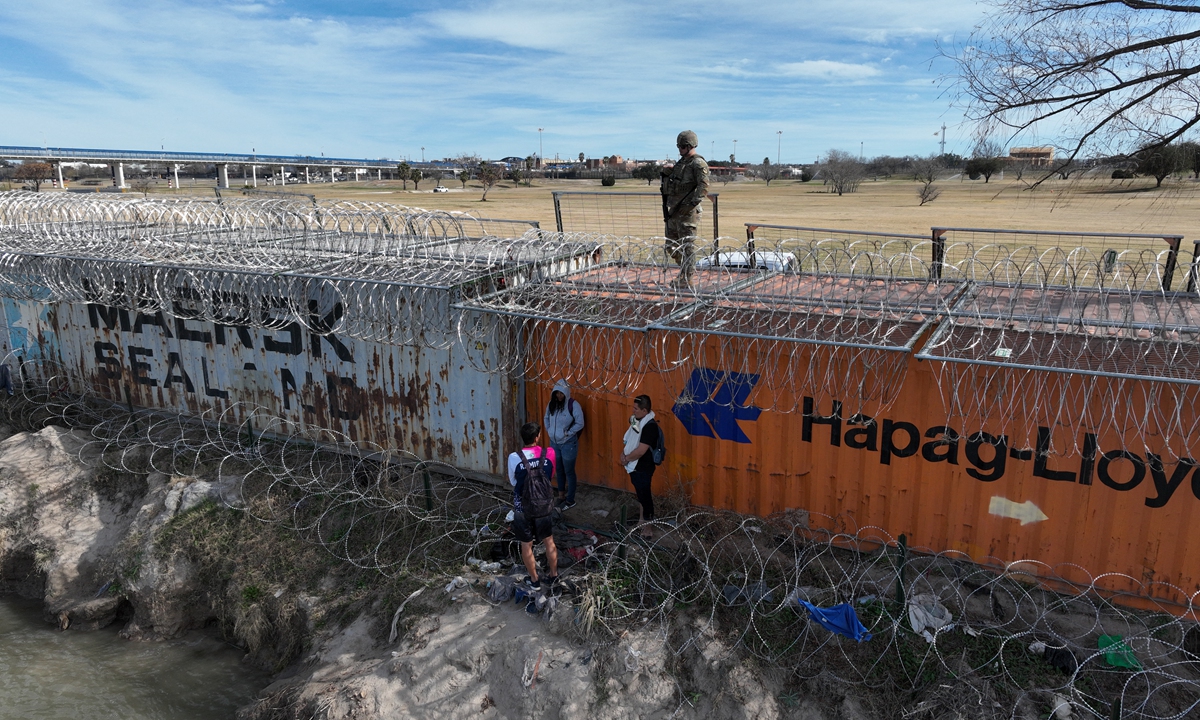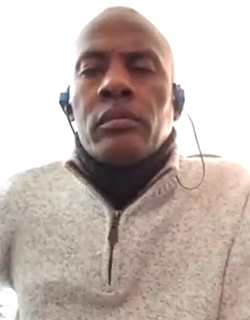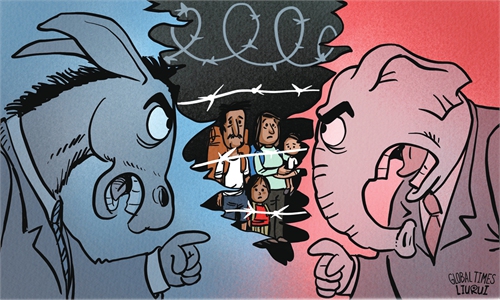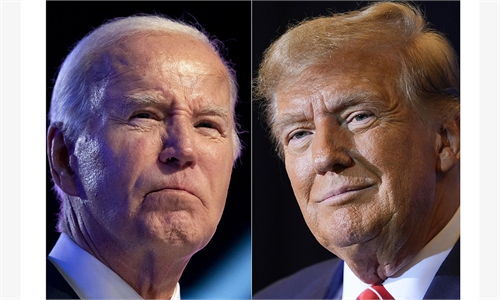
United States National Guards take measures at Shelby Park, where migrants try to cross the wire-spikes on the border in Eagle Pass, Texas, on January 30, 2024. Photo: AFP
Editor's Note:The conflict between Texas and the US federal government continues to have a major impact on the US. The border issue, which has been going on for quite some time, is receiving particular attention during this election year and has amplified the voices calling for Texas independence. The border issue "has been that way for decades. Now it's the worst it's ever been," said Claver Kamau-Imani (Kamau-Imani), a multi-generational Texan. Kamau-Imani is a leader of the Texas Nationalist Movement and has advocated for Texas independence since 2010. He considers himself a Texan first, an American second. In an interview with Global Times (GT) reporter Wang Wenwen's I-Talk show, he talked about the current border situation in Texas now and how it will affect this year's US presidential election.
GT: What does the feud between Texas and the federal government expose?
Kamau-Imani: The border situation magnifies the macro problem of federal government overreach. The federal government has to have a constitutional license to do certain things. Article 1, section 18 of the US Constitution teaches us on the 18 things the federal government is only supposed to have authority over. Everything else was to be left to the state authority. That's the 9th and 10th amendments of the United States Constitution, the Bill of Rights. If it's not enumerated in the Constitution, the US federal government is not supposed to have any authority within it at all. The federal government was only supposed to operate in a very few areas of American life. But it has expanded to where it's dominant in every aspect of American life. One of our arguments for "Texit" is that federalism has essentially disappeared.
Another hot topic is the issue of abortion. The issue wasn't whether to make abortion legal or illegal. The question was whether it's a federal decision or whether it should be left to the states. And the Supreme Court said this power and authority should be returned to the states. You see this argument over federalism versus centrally controlled government. That's why you have so many states that are disenchanted with the way the US is being governed now. A few of those states have the ability to move away from the union, the way Texas has that ability.
GT: How is the situation along the border right now? Is the issue getting particular attention because this is an election year?
Kamau-Imani: It's been that way for decades. Now it's the worst it's ever been. Since the Biden administration took office on January 20, 2021, he reversed really all the Trump border policies, which has caused the crisis that we see today. At least domestically here in America, I hyperfocus on the growing problem of the southern border, especially here in Texas. The spotlight on the border is not new. I think the international attention on the border, which we receive from the international press, is because we're going into a very critical election year that can surely be historical, something that we haven't seen since the days of Grover Cleveland, a president that was defeated and has the possibility of returning to the White House that has only been done once in American history.
The international media is very intrigued by that and understands the critical nature of the border situation, how it is an anchor of weighing down the Biden administration and the Biden-Harris reelection campaign. But for us in Texas and generally in America and the American electorate, the border crisis has been front and center for quite some time.
GT: Since the standoff between Texas and the federal government started, some have pointed to a “civil war.” How likely is a civil war?
Kamau-Imani: I don't see it happening. I think it's important that we emphasize we don't want war. We don't want violence. We want trading relations, we want mutual defense agreements. We just don't want your level of taxation and your governing philosophy. We don't want your regulatory environment. We don't want your new morality. We're conservatives, and we believe in severely constrained government.
Washington doesn't believe in federalism anymore. It's disappeared. I think it should be an amicable divorce through negotiations, through the electoral process. We don't hate America and I believe that Americans across the country wouldn't stand for any type of military action against Texas. I think that anybody who is speaking of civil war is fearmongering, is demagoguery and is stoking sensationalism. I do not think civil war is possible as we stand as Americans today.
GT: Some believe Trump and the Republican Party are using the border issue to cause troubles for Biden as the presidential race has started. Do you agree?
Kamau-Imani: I would agree with that statement. They want the issue. Trump wasn't doing a great job on the border. In comparison to what Biden is doing, he's fantastic. No, he wasn't. Now people think Trump is the good old days, but there were people who were storming the border during the Trump administration. So they are using the border issue now because of the polling data that shows the border and illegal immigration have now overtaken the health of the economy as the No.1 political issue. It's smart for them to do so. Victory is the most important thing for them.
The Border Security Bill is a joke. It is not a serious attempt to protect Texas sovereignty. There are too many other things attached to it. Address border security alone. Don't tie Ukrainian aid to border security; don't tie Israeli or Palestinian aid to border security. Our sovereignty, the protection of our citizens, is the issue first and foremost. Debate separately.

Claver Kamau-Imani. Photo: Interview screenshot
GT: How will Biden and the Democrats use this issue?Kamau-Imani: They'll use propaganda. They'll use political argument saying that we tried to get this bill done, it was bipartisan and these MAGA Republicans voted against it. More importantly, they will try and avoid the issue of the border. They do not want to talk about the immigration crisis, the humanitarian crisis, the national security and sovereignty crisis that they've created. They want to avoid that issue and talk about other things. Republicans will talk about it. Republicans will hammer away at it. Democrats and all the left media will avoid it. They won't go down there. They won't mention it, they'll black it out.
GT: How will the whole saga affect the presidential election?
Kamau-Imani: I think it will have a major impact, because all the polling data right now shows it is the No.1 concern of the American electorate, even over the economy, crime and education. The border and immigration always were out there in the top three or four as far as concerns of the American electorate. But now it's the No.1 issue that people are citing in this primary election season. As bad as the economy is and as troubled as people are about their standards of living and the quality of life, they are more concerned about the border invasion.
It's going to work against the incumbency. People remember the way things were four years ago, just as the people of Brexit remembered what it was like in the UK before the European Union. They remember the difference in the quality of life, the standard of life, just four years ago. Gas was cheap, clothes were cheap, and food was cheap. Mothers could get formulas for their babies. I think the border situation is going to have a major impact on the election. It's not gonna disappear over the next nine months.
GT: An American observer said, "The only force strong enough to bring down the United States is itself." Do you agree?
Kamau-Imani: To some extent, I do agree with that. It was the internal rot that brought down the Roman Empire, the Greek Empire, and the Egyptian Empire. It will be the internal rot that ends the Great America era. Not that we have an empire or anything like that, but global dominance could potentially end for the US because of its internal problems. I believe that is a possibility.
There's no guarantee that America is going to be the global dominant power forever and ever remain. If America wants to continue its global dominance, it had better have very good stories on its leadership. It had better be a good country. It had better believe in life, liberty, and prosperity. I think America has left those three pillars of a free society - the right to life, the right to liberty, and the right to pursue happiness and prosperity. I think these truths of the American founding are being abandoned. That's gonna make the country extremely vulnerable. On this current trajectory, it is not hard to imagine a day when those days of American global dominance, the ultimate superpower, will come to an end. I don't think that's a doomsday scenario. I just think that's a study of human history.
GT: You have been promoting Texas independence since 2010. How much of an impact can people like you have?
Kamau-Imani: We encourage the rank-and-file citizens of the state and even beyond to be a part of the organization and what we're doing. As ambassador at large, as an adviser to Daniel Miller, the President of the Texas Nationalist Movement, and as chaplain, I have a little bit more impact than the normal rank-and-file members. I do have the leadership's ear on many of the matters that the direction of the organization goes. I'm a representative of the organization, a spokesperson for the organization, and for the movement.
The biggest plus is that it is a non-violent movement. We are not advocates of violence. We don't ask any of the citizens to be part of any type of military. We have no desire, no focus to be successful in that matter. We believe we can do it through the political process, through the electoral process, through the ballot box. That is all that is necessary and that is the direction that we choose to take.
There are many challenges. The greatest challenge that we have is changing minds, convincing even Texans that it's possible, that it is legal, that it is allowed. It's not treason, it's not being rebellious, it's not being violent, it's not being anti-American. We're not anti-American. We don't hate America. We just understand that we will be a whole lot richer, and a whole lot freer if we weren't part of the Union.
Kamau-Imani: It happens like that: Something will happen in national or international politics or geopolitics. And all of a sudden, we get a spike, an interest in membership and donations and activism from citizens. It goes up and down based on those issues that are at the top of the news cycle at the time.
Obviously, right now, the border and the feud between President Biden and Governor Abbott is a catalyst for the conversation on "Texit." They may have not made up their mind whether they're pro or against. They may still be hurtling the fence. But all polling data shows that the majority of Texans believe that there should at least be a vote on the issue.


